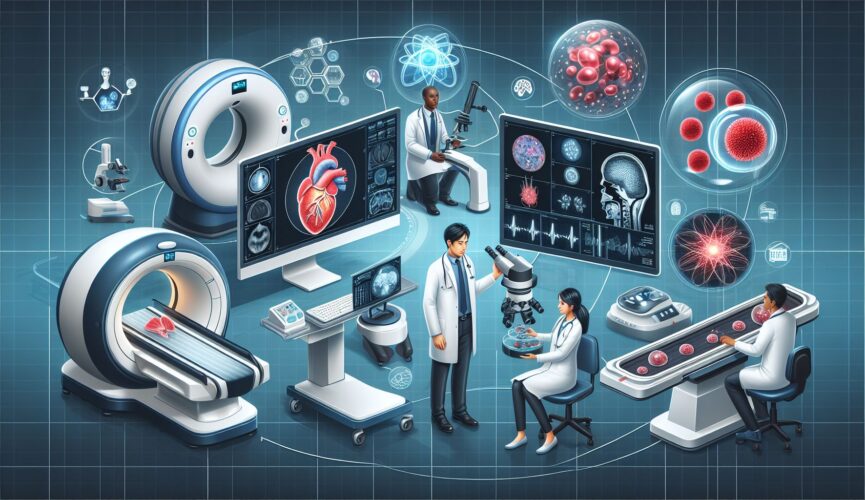The field of medicine has come a long way, revolutionizing the way diseases are diagnosed, treated, and prevented. In recent years, medical technologies have played a crucial role in saving lives and improving the overall well-being of individuals. From advancements in diagnostic tools to personalized treatment options, healthcare professionals now have a multitude of powerful tools at their disposal. In this article, we will explore some of the remarkable medical technologies that have had a significant impact on disease prevention.
Detecting Diseases at an Early Stage
Early detection is often a critical factor in successfully treating diseases. Fortunately, medical technologies have made remarkable strides in this area. Screening tests, such as mammograms and colonoscopies, have become more accurate and widely accessible, enabling the detection of conditions like breast and colon cancer at their earliest stages. The advent of molecular diagnostics has allowed for more precise and rapid identification of infectious diseases, genetic disorders, and certain cancers. By catching diseases in their infancy, healthcare professionals can intervene promptly, significantly increasing the chances of successful treatment.
Advancements in Imaging Techniques
Another area where medical technologies have flourished is in diagnostic imaging. Today, healthcare providers have access to a range of tools that allow them to visualize internal structures with unprecedented clarity. Magnetic Resonance Imaging (MRI) and Computed Tomography (CT) scans provide detailed cross-sectional images of the body, aiding in the diagnosis of conditions like tumors, internal bleeding, and organ abnormalities. Ultrasound imaging has emerged as a safer alternative for monitoring pregnancies, offering invaluable insights into the health and development of the fetus. These imaging techniques not only save lives by detecting diseases earlier but also guide medical interventions, reducing the need for invasive procedures.
Harnessing the Power of Artificial Intelligence
Artificial Intelligence (AI) has made substantial contributions to the field of medicine. By analyzing vast amounts of data and spotting patterns that may not be apparent to the human eye, AI algorithms have proved instrumental in disease prevention and management. The ability of AI to recognize deviations from the norm has led to the early detection of conditions like diabetic retinopathy and certain skin cancers. Moreover, machine learning algorithms can anticipate disease outcomes by assessing a patient’s medical history, genetic profile, and environmental factors, enabling healthcare providers to intervene, prevent complications, and improve patient outcomes. AI’s potential to transform medicine is continually expanding, and its integration with medical technologies continues to save lives.
Precision Medicine: Tailoring Treatment to Individuals
Traditionally, healthcare has been based on a one-size-fits-all approach, with treatments often generalized for large groups of patients. However, medical technologies have paved the way for precision medicine, an approach that considers an individual’s unique genetic makeup, lifestyle, and environmental factors to tailor treatment plans. Pharmacogenomics, for instance, leverages genetic testing to predict how patients may respond to specific medications. This knowledge allows healthcare providers to prescribe the most effective drugs while minimizing adverse reactions. By personalizing treatment options, medical technologies have transformed disease prevention, ensuring that patients receive the most appropriate care for their individual needs.
Enhancing Patient Engagement and Education
Technological advancements have not only improved disease prevention but have also empowered individuals to take an active role in managing their health. From wearable devices that track heart rate and physical activity to smartphone applications that enable patients to monitor their blood glucose levels, medical technologies facilitate data-driven insights that enhance patient engagement. By actively participating in their own healthcare, individuals can make informed decisions and proactively take steps to prevent diseases. Furthermore, e-learning platforms and telemedicine have emerged as valuable resources for educating patients remotely and facilitating better access to healthcare services in underserved areas.
Conclusion
Medical technologies have revolutionized disease prevention, enabling early detection, personalized treatment, and active patient engagement. From breakthroughs in diagnostic imaging and the application of AI in healthcare to the advent of precision medicine, these technologies continue to save lives and transform the field of medicine. As technology evolves, the potential for further advancements in disease prevention is virtually limitless. By embracing these innovative tools, healthcare professionals can maximize patient outcomes, reduce the burden of diseases, and ultimately improve the overall well-being of individuals around the world.
